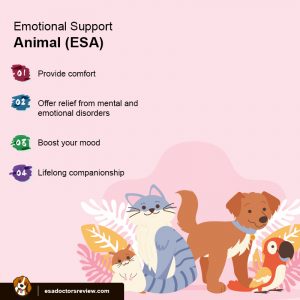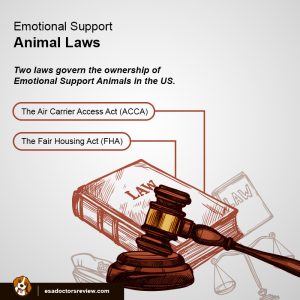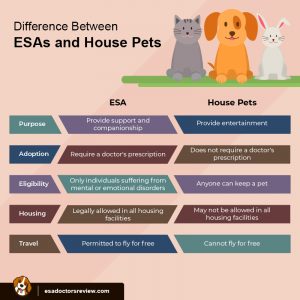For people who have been diagnosed with mental disabilities like anxiety or depression, Emotional Support Animals (ESAs) offer companionship and support necessary for them to ease their symptoms and lead normal lives.
Before we dive into details about ESA federal law, click on the button below and read reviews about some of the best ESA clinics.
If you are considering getting an Emotional Support Animal, you will be pleased to know that ESAs enjoy protection from Emotional Support Animals federal laws, which offer privileges that do not apply to other pets.
To get the best out of your Emotional Support Animal, you should know Emotional Support Animals federal laws. So that you can protect your rights and those of your ESA.
Here is a detailed companion animal law guide for you.
1. Introducing Emotional Support Animals
Emotional Support Animals (ESAs) are animals that provide comfort and therapeutic benefits to individuals struggling with the effects or symptoms of emotional or mental disabilities.
Since Emotional Support Animals offer relief from mental and emotional disorders. They are usually prescribed as part of a treatment strategy to help promote recovery in patients suffering from recognized disabilities.
Read some reviews of your favorite ESA clinic on the link below.

Most patients with mental or emotional issues tend to not only lose interest in activities they previously enjoyed but also have the tendency to distance themselves from others.
If you suffer from mental health issues, you understand how much of a toll it can take on your social life. Luckily, Emotional Support Animals exist to remedy the situation. They offer you friendship and companionship, which can help you boost your mood and even regain interest in fun activities.
An ESA can completely alter your perspective about life and your present circumstances, putting you on the right path to recovery and improving the quality of your life.
With an Emotional Support Animal on your side, you enjoy the attention, companionship, and comfort that they provide. ESAs also instill a sense of security and protection, making it easy for you to deal with situations that could trigger your anxiety, such as being alone in public places or being surrounded by strangers.
ESAs are like real-life plush toys that people with mental disabilities find solace in while they cuddle with them.
Unlike friends and loved ones who may not always be by your side whenever you need them. Emotional Support Animals will always be present in your life. It doesn’t matter whether you are traveling, going shopping, or just having alone time at home. An ESA is a source of a reliable company, so you don’t feel alone.

With the emotional support that ESAs provide, you are bound to experience relief from mental health disorders and live a happier life.
2. Animals That Can Be Considered as Emotional Support Animals
The good thing about Emotional Support Animals is that you don’t have to choose from a limited type of animals or species when selecting an ESA.
This is because any domesticated pet can become your ESA provided they offer you emotional support, can significantly relieve your symptoms and play a big part in helping you lead a normal life.
While there are no rules to which animals can become an ESA, your Emotional Support Animal should be easy to handle in public. This is because you will be spending most of your time both in the confines of your home and in public areas.
ESAs should also be good-mannered so they don’t become a nuisance to both the owner as well as the general public. However, this doesn’t mean you have to take your emotional support animal through special training.
Ideal Emotional Support Animals should obey simple commands for the benefit of the owner. Take note that ESAs are not trained to perform any special tasks for their owners. Some of the most commonly preferred ESAls include;
Don’t forget to read reviews about authentic ESA letter providers.
Although the above animals are eligible for a recommendation as ESAs, cats and dogs make the majority of referred choices among most patients. Studies show that most patients choose cats or dogs as they perceive them to be more convenient in facilitating their journey to recovery.
While the choice of ESA boils down to personal preference, it is understandable why cats and dogs rank the highest. Not only are they intelligent animals capable of sensing human emotions, but they are easy to train so that they can behave well and obey simple commands in public.
For most people, cats come off as self-centered animals. However, you may be surprised to know that cats and dogs are highly sensitive to human needs, feelings, and emotions compared to hamsters, birds, and rabbits.
On the other hand, dogs have long been considered as a man’s best friend due to their loyalty and usefulness to their owners. These traits are also the reason they make one of the best animal support animals.

Whether you prefer a dog, hamster, or a parrot for your mental and emotional well-being, you can always get your doctor to prescribe you your ideal animal to help you live a better life.
3. Disabilities that Legally Qualify You for an Emotional Support Animal
Mental health disorders are very hard to recognize and diagnose, which is why you may not know when someone is going through an emotional or mental rollercoaster.
What’s more, everyone experiences mental health issues differently, such as social anxiety, where you are scared of being in public with strangers, or even depression.
Whatever the condition, everyone looks forward to living a healthy, happy, and normal life, which is why most people seek medical attention to help them recover.
The good thing is that mental health conditions can be managed, and one way to treat them is with the help of Emotional Support Animals.
Click on the banner below and read reviews about an ESA clinic.

Usually, your therapist or doctor will prescribe an Emotional Support Animal to complement your treatment for various reasons. This could be because the medication you are using does not show the desired results, or there is no change in behavior with your current treatment.
In such cases, your healthcare provider will take you through the option of having an ESA to help you recover.
Emotional Support Animals are usually a go-to option for patients suffering from a myriad of mental health and emotional issues. However, since there are specific regulations that govern Emotional Support Animals, there are specific conditions that are legally recognized by the law.
The emotional or mental disorder must be disabling to the sufferer, not just causing discomfort. An ESA must be proven to provide relief to the symptoms or effects of your disability, which should be certified and confirmed by a licensed healthcare professional.

Some of the mental health disabilities that qualify for ESA recommendations include.
- Post-Traumatic Stress Disorder (PTSD)
- Depression
- Anxiety
- Obsessive-Compulsive Disorder (OCD)
- Bipolar Disorder
- Panic Attacks
- Phobias
- Mood Disorders
If you suffer from any of the above mental disabilities to the point that it affects your ability to function and go about your daily routines, an ESA can have a positive effect on your health.
Your ESA will ease your anxiety, boost your mood, and help you deal with difficult situations healthily.
Below are how Emotional Support Animals can help boost your mental health.
-
PTSD
Post-traumatic stress disorder mostly occurs as a result of negative and traumatizing life experiences such as accidents or abuse, leaving an individual with mental scars.
An ESA can alleviate the symptoms of PTSD by radiating positive vibes as well as being a source of comfort to help you feel calm and sleep better.

This way, you reduce your chances of getting anxiety attacks and experiencing nightmares.
By spending more time with your ESA, you get distracted from thinking about the awful life experiences and also enjoy the never-ending stream of affection from your furry friend.
-
Depression
When battling with depression, you not only experience feelings of doom and hopelessness but also:
- tend to lose interest in previously fun activities
- withdraw from people
- experience anxiety
Emotional Support Animals can relieve depression by reducing anxiety, which is common in individuals with depression. They also provide companionship and friendship, which eliminates the feelings of loneliness, motivates social interactions and connections, and cultivate positive emotions.
With an ESA by your side, you will find yourself playing and caring for it, thus helping you reclaim your love for fun activities and develop a sense of self-efficacy and independence.
Click on the button below and find out which clinic is offering the best ESA consultation.
-
Anxiety
Anxiety is the most common mental disorder affecting more than 40 million adults in the U.S. When you suffer from an anxiety attack, you can cuddle or pet your Emotional Support Animal so you can regain calmness.
Since ESAs provide companionship and non-judgmental support, you can also release your anxious feelings by talking to your animal as a way of letting go.
By providing comfort and a sense of stability, an ESA can help lessen the intensity of anxiety symptoms.
-
Obsessive-Compulsive Disorder (OCD)
Individuals who suffer from OCD struggle a lot with the negative feelings that come as a result of compulsive behaviors. This is because they tend to get anxious and distressed when they don’t do certain repetitive tasks for fear of something bad happening.
As such, having an ESA acts as a good distraction to these feelings. ESAs also offer a sense of comfort and protection when nervousness and anxiety creep in. OCD patients may also realize that ESAs help them focus on more important things. Instead of dwelling on upsetting and triggering thoughts.
-
Bipolar Disorder
Bipolar disorder is characterized by manic and depressive phases where you are hyper and happy one moment and depressed and “low” the next moment.
For people suffering from bipolar disorder, the presence of Emotional Support Animals offers a sense of stability as well as routine. They can also help bring you back to reality when you feel disconnected and act as a source of distraction during manic episodes.
All we want is to lead you to the best ESA clinic.

-
Panic Attacks
Panic attacks are a common occurrence, especially for people suffering from anxiety. They occur as a result of extreme fear of something bad happening.
If you suffer from a panic attack, the presence of an ESA can calm you down, relieving your symptoms. Cuddling with or holding your ESA has a calming effect and helps lower your heart rate and blood pressure.
Check out the reviews of authentic ESA clinics.
-
Phobias
An Emotional Support Animal can help you deal with phobias by providing a sense of security, reassurance, and comfort. The sheer presence of your ESA will help you calm down when you are faced with a normally scary situation.
If you suffer from social phobia, ESAs will motivate you to go out and interact with the outside world. Such as walking your dog or playing with your ESA outdoors.
Doing this helps improve your social interaction and transforms them from dreadful to enjoyable experiences.
-
Mood Disorders
Mood disorders play on the emotions of patients. An ESA provides a company that helps enhance your endorphins and increase your positive emotions.
Research has shown that when you interact with your pet or Emotional Support Animal, it triggers the release of oxytocin, which helps you relax.
4. Emotional Support Animals Federal Laws
If you want to keep and travel with your Emotional Support Animal legally, you must have an ESA letter as evidence of your need for the animal for the sake of your mental and emotional health.

However, owning an ESA comes with the obligation to adhere to all Emotional Support Animals federal laws regarding their ownership.
Before getting an Emotional Support Animal, you should understand all the relevant laws and regulations regarding you and your ESA. This will help you avoid problems with the law. It will also enable you to fully enjoy the benefits that an ESA has on your mental and emotional health.
When talking about Emotional Support Animals federal laws there are two laws that govern the ownership of ESAs in the US. These are the Air Carrier Access Act (ACCA) and the Fair Housing Act (FHA).
Read on to find out what these Emotional Support Animals federal laws entail as well as what you can expect from your landlord or airline where your Emotional Support Animal is concerned.
It will take only a few minutes, go ahead, and read reviews for different ESA services providers.
1. The Air Carrier Access Act (ACCA)
The Air Carrier Access Act (ACCA) allows any mentally disabled individual who needs the help of an Emotional Support Animal to be permitted to board a plane with their ESA without having to pay any additional fee. The rules apply to all airlines in the USA.
If you are going to be accompanied by your ESA on a trip, you will have to show a legitimate ESA letter to the airline to be permitted to board a plane with your ESA.
Thereafter, the ACCA will ensure that the airline adequately accommodates both you and your ESA. What’s more, no airline is allowed to limit or ban an ESA based on its breed as there are no limitations to what species can play the role of an Emotional Support Animal.
Before you read ahead, make sure to read reviews to make the best choice.

In case the airline feels that the rest of the passengers may not like sharing the cabin with your ESA, or some passengers are allergic to animals on board.
Then the airline is obligated to provide a separate cabin to accommodate you and your pet.
Keep in mind that you need to communicate with your airline about your mental disability as well as your need to travel with your ESA at least 48 hours before your boarding.
How an Emotional Support Animal Helps During a Flight
Emotional Support Animals can calm you down, provide companionship during your travel, and offer comfort. If you are scared of traveling alone or have a fear of heights, the presence of your ESA will help you relax and feel reassured.
This way, your flying experience doesn’t become as terrifying as when you are traveling alone.
Required Documentation
If you are traveling with your ESA, the authorities will require you to provide the relevant documentation.

While every airline may have different documentation requirements, below are common documents you must have before boarding a plane to help you avoid a misdemeanor.
- An Emotional Support Animal Letter that is signed and approved by a licensed healthcare provider. This should include your emotional disabilities, the doctor’s explanation of why you need to travel with your ESA, as well as the date and type of the mental health professional’s license. Your letter should also show the jurisdiction under which it was issued.
- Passengers’ guarantee behavior form that shows your animal is well-mannered.
- Veterinary documentation showing the vaccination details of the animal and if it needs special accommodation. It should also have the vets’ contact information and license.
- Animal sanitation form. This is for when you have an over 8-hour flight, and you need to state that your ESA can relieve in a sanitary manner when need be.
Read reviews to gain perspective.
Ensure all your documents are accurate and up to date. You must ensure that your ESA letter, which usually has a validity of 1 year, is within the expiry period as you won’t be able to board a plane if it is expired.
2. The Fair Housing Act (FHA)
Finding an ideal home to live with your ESA can be a difficult task, given the no-pet policy in most apartments. If you have an ESA letter, the Fair Housing Act (FHA) protects you and your Emotional Support Animals from being denied access to homes with no-pet policies.
According to the law, your landlord is required to accommodate you and your ESA in the property whether or not it has a no-pet policy. The law prohibits landlords from being biased against individuals with specific mental disabilities who need ESAs to lead normal lives.

As such, they are required to provide fitting accommodation considering their need for ESAs.
As per the American Disabilities Act(ADA), Emotional Support Animals are neither seen as service animals nor considered as pets. However, they are considered therapy animals who boost the mental well-being of their owners as they help alleviate stress and anxiety.
This gives individuals with ESAs the right to live with them without restriction by landlords.
Click on the button below and find out which clinic is offering the best consultations.
Reasonable Accommodation for You and Your ESA
The law states that any person who has a mental disability and needs to keep an ESA for their wellbeing should be allowed to do so without restriction.
Therefore, the landlord is obligated to accommodate you and your ESA in the apartment, given that you have a legit recommendation for an ESA from your doctor.
Documents Required for Accommodation
To be allowed to stay in an apartment with your ESA, you only need to provide an authentic ESA letter signed by a licensed healthcare professional.
With an ESA letter, your landlord has no right to question you over your disability. Ensure that the ESA letter you provide is up to date and explains your need for an Emotional Support Animal.
5. The Difference in Travelling Laws for ESAs, Pets, and Service Animals
With the adoption of ESAs becoming popular, it is important to understand that ESAs differ from pets and service animals. Therefore, the traveling laws regarding these animals are all different.
Read on to understand how traveling laws differ depending on the kind of animal you keep.
1. Traveling Laws for ESAs
The law allows you to travel with your ESA for free, provided you present an authentic ESA letter signed by a licensed healthcare professional.
Your ESA letter should be up to date, and you must communicate to your airline at least 48 hours before your travel that you will be traveling with your Emotional Support Animal.
You can travel with your ESA in your cabin as long as it behaves well. If you have a small Emotional Support Animal, you can hold it while traveling.
On the other hand, bigger animals may be provided a seat or space on the floor or placed into a cage under the passenger seat if possible.
Keep in mind that different airlines may have different laws regarding ESAs. It would be best to inquire from your specific airline all the information you need regarding traveling with your Emotional Support Animal.
Why not read honest reviews about some of the best ESA clinics? Just click on the banner below.

2. Travelling Laws for Pets
Unlike an ESA, you cannot travel with your pet for free as you will have to part with anything between $100 and $200 for it to be allowed in the passenger cabin.
While most airlines put pets inside the cargo hold, some may allow you to stay with your pet during travel as long as it is in a cage. However, airlines are not obligated to accommodate pets.
3. Traveling Laws for Service Animals
Owners of service animals can travel with their animals in the passenger cabin as per the law. What’s more, airlines are responsible for accommodating service animals during travel. Only one service animal is allowed per patient.
When traveling, your animal should have a vest or tag that identifies it as a service animal.
For you to fly with your service animal in the passenger cabin, it should be toilet-trained and well-mannered. You should also not share your tray with your service animal, and it shouldn’t be a nuisance to other passengers as you risk having your furry friend accommodated somewhere else.
6. Emotional Support Animals vs. House Pets in the Eyes of the Law
While you may see ESAs and house pets as one thing, they are classified and perceived differently in the eyes of the law. Below are some of the main factors that set apart ESAs from pets.

1. Purpose
Emotional Support Animals provide support and companionship and are solely recommended for treatment purposes to individuals suffering from emotional and mental disabilities like anxiety and depression.
Housepets, on the other hand, are animals adopted largely for entertainment purposes and serve no medical function.
2. Adoption
To adopt an ESA, you need a recommendation or prescription from a licensed healthcare provider. Showing that you need an Emotional Support Animal to alleviate your mental disability.
The process of adopting a pet does not require a doctor’s prescription.
3. Eligibility
While anyone can keep a pet, only individuals suffering from mental or emotional disorders are eligible to keep ESAs. What’s more, the mental disorder should be confirmed by a licensed medical health professional and should be severe enough to disrupt your ability to function rather than causing mere discomfort.
The law allows you to turn your pet into an ESA, but you cannot turn your ESA into a pet.
Have you read honest reviews yet? If not, click on the button below.
4. Permits
Emotional Support Animals are protected by federal law and allowed special treatment as they are recognized as of immense importance to their owner’s health.
Normally, pets may not be allowed in certain places such as public parks, hotels, and even shopping centers. However, you can legally access places and live in apartments with no-pet policies with your ESA as long as you have an authentic ESA letter.
5. Traveling
Although a pet cannot travel with you on a plane for free, your Emotional Support Animal is permitted by the Air Carrier Access Act to board a plane with you for free.
What’s more, your airline is expected to provide appropriate accommodation to you and your ESA according to the law.
6. Dependence
Since you can adopt a pet either for companionship or entertainment, your mental well-being may not necessarily depend on it.
On the contrary, people who keep ESAs rely on them for emotional support and better mental health.
Read reviews and avoid making wrong choices for your ESA letter.

7. How Emotional Support Animals Federal Laws Differ from Service Animal Laws
Service animals are dogs that have been trained to perform specific tasks for people living with disabilities such as the blind, the deaf, and even people in wheelchairs.
They are trained to retrieve items, provide protection, alert their owners, and even provide physical support for people with mobility problems.
Just like ESAs, service animals are not categorized as pets and are protected by the Americans with Disabilities Act (ADA). However, the law perceives ESAs differently from service animals.
Since service animals help their owner complete specific tasks, they can accompany their owners everywhere, including places where neither pets nor service animals are allowed, such as hospitals. The law allows the owner to be with their service animal at all times.
Although ESAs are prescribed to people living with mental disabilities. Doctors encourage individuals with handicaps to acquire service animals to help them perform certain duties that they can’t do on their own.

When it comes to the purpose of the animal, you can keep an ESA for the company and support to help you deal with a mental disorder. However, service animals exist not for the company but for the purpose of conquering your disability by helping you carry out activities that you normally wouldn’t due to your condition.
Despite the differences between service animals and ESAs, both categories can accompany you to school or college, and your school dorms are required to accommodate them.
8. Training an Emotional Support Animal vs. A Service Animal
Service animals undergo special training before they can be adopted. They have to learn how to take orders, perform simple tasks like leading the blind, fetching things, and even open and closing doors. Service animals can also be trained to understand sign language. The training that service animals get is usually directly related to a disability. ESAs, on the other hand, don’t require special training. This is because they only provide comfort and emotional support, unlike service animals that need to complete tasks for their owners.
Since service animals are more like assistants to the disabled, the law requires service animals to have vests that differentiate them from other animals like pets and ESAs. You don’t have to get a vest for your ESA.
9. Getting an ESA Letter
Whether you want to turn your pet into an ESA or adopt a new Emotional Support Animal, you need an ESA letter to help you live, travel, and spend quality time with your ESA.

An ESA letter is written by a licensed doctor or therapist showing that you suffer from a mental disability that requires you to have an Emotional Support Animal to help you recover. With an ESA letter, you can travel and live with your ESA, even in areas where pets are not allowed. You only need to go through the following simple steps to get an authentic ESA letter. But before that, take some time out and read reviews of authentic ESA letter providers.
1. Book an appointment
The first step to getting an ESA letter is booking an appointment with a licensed and experienced mental health professional. Always ensure that you are dealing with an authentic and licensed healthcare provider to avoid ending up with a fake ESA letter.
2. Open up about your mental health
Once you get in touch with your therapist or doctor, explain in detail your mental health as well as your need for an ESA. Your healthcare provider will assess and evaluate your condition to establish your suitability for an Emotional Support Animal before issuing you with a recommendation letter.

3. Apply for an Emotional Support Animal Letter
After your assessment, you can then apply for an ESA letter from a reliable healthcare provider. You can do this by either visiting your doctor or making an online application from a legitimate website.
4. Fill the form
You will be given a form to fill when you apply for an ESA letter. Ensure that you provide accurate details regarding your credentials, mental disabilities, and why you think an Emotional Support Animal is necessary for your mental health.
Keep in mind that the information you provide will go a long way in determining whether or not you will get an ESA letter.
5. Choose an Emotional Support Animal
Once you have filled the form and your application is approved, it is time to select an Emotional Support Animal. You can choose your present pet to become your ESA as you already have an existing connection with it. If you don’t have a pet, you can always adopt a new animal. With the help of adoption agencies so that you can begin your journey to a healthier and happier life.
All we want is to lead you to the best ESA clinic. Read reviews about the one that could be the wrong choice!
Conclusion
Federal ESA laws protect your rights as well as those of your Emotional Support Animal. As such, you must adhere to all the rules and regulations related to your ESA to enable you to live harmoniously with the people around you and also avoid getting on the wrong side of the law.
This way, you can enjoy the company of your Emotional Support Animal without interference and improve your mental health as well as your quality of life.
Be smart, look deeper, and don’t forget to read reviews before you go!








